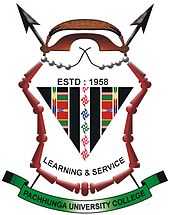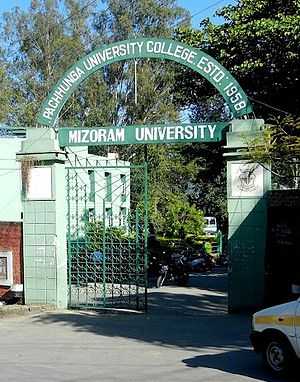Pachhunga University College
| Pachhunga University College | |
|---|---|
 Official Logo | |
| Motto | Learning and Service |
| Established | 1958 |
| Type | Public |
| Principal | Dr Tawnenga |
| Admin. staff | 93 teaching, 95 non-teaching |
| Students | 1993 |
| Location | Aizawl, Mizoram, India |
| Campus | Urban |
| Affiliations |
UGC, Mizoram University |
| Website | http://www.pucollege.in |
Pachhunga University College (PUC) is a constituent college of Mizoram University, a central university established by an Act of Parliament of India. Founded in 1958, it is the oldest and a premier college in the entire state of Mizoram, India. It is situated in College Veng, a locality located at the eastern side of Aizawl city. The 136 acre campus covered with a verdant reserve of forest makes a serene environment and a picturesque scenery.[1] It remains the only institute of higher education in Mizoram to manage undergraduate courses in three disciplines, namely arts, science and commerce.
It remains the only institution in Mizoram to be awarded the Indira Priyadarshini Vriksha Mitra (IPVM) in 1995, the national award for pioneering and innovative contribution in the field of afforestation/wasteland management, from the Ministry of Environment and Forests, and the Best College award from the Zoram Research Foundation, twice, consecutively in 2004 and 2006.
History and development
The college was inaugurated as Aijal College on the day of the 11th Independence Day of the country on 15 August 1958 at Aizawl Theatre Hall (now Vanapa Hall),[2] by the then Deputy Commissioner of the Lushai Hills District (former name for Mizoram under the Government of Assam), Lawrence Singh Ingty. The start of the college was primarily at the behest of the enthusiastic locals in order to meet the growing need of higher education among the native Mizo youth. The faculty originally comprised a team of Christian missionaries, with a few educated natives, who worked purely on voluntary basis. At the onset, classes were conducted at the Theatre Hall itself, and towards the end of 1961, the college moved to an abandoned warehouse at Children's Park. In 1962 it was renamed Pachhunga Memorial College (PMC) after the philanthropic entrepreneur Mr. Pachhunga, he and his family who were outstanding benefactors of the college since its inception. It was relocated to its permanent campus in June 1965. On July 1, 1965, the Assam Government declared provincialization, and the name was once more changed to Pachhunga Memorial Government College (PMGC). Permanent teachers were appointed only in 1967 under the Assam Public Service Commission. UGC granted recognition in 1969. When the Mizoram Union Territory was formed in 1972, the management of the college was handed over to the Government of Mizoram. Eventually, the entire administration was taken over by North Eastern Hill University (NEHU) on 19 April 1979, and became the one and only constituent college of the university, and the name ultimately becoming Pachhunga University College (PUC). With the setting up of Mizoram University on 2 July 2002, the authority was once again signed over to the new university; and remain as such ever since.[3]
Faculty and course progression
For a start, the faculty consisted of only Intermediate of Arts (I.A.; modern equivalent of higher secondary) with five subjects such as English, Civics, Geography, History and Logic. The courses were affiliated to Gauhati University in 1961. New courses on basic science were instituted in 1973. In 1974 the affiliation was transferred to the newly established North Eastern Hill University. The faculty of commerce was introduced in 1984, and with this, the college was, and remains, the only institute in Mizoram to offer the three different disciplines. Department of Public Administration was initiated in 2005. From 2012 two new departments, viz. Biotechnology and Environmental Science, were started. Presently, there are 11 departments in arts (English, Economics, Education, Geography, History, Mizo, Philosophy, Political Science, Psychology, Public Administration and sociology), 9 in science (Biotechnology, Botany, Chemistry, Environmental Science, Geology, Mathematics, Physics, Statistics and Zoology), and 1 in commerce. All these departments offer core/honour subject for Bachelor's degree. IGNOU Study Centre 1923 offers certificate courses such as in Environmental Studies, Laboratory Techniques, Higher Education, and HIV and Family Education, along with bachelor degrees in arts and science.[4]
Present status
There are 93 permanent teachers, including the Principal. 39% of them possess PhD and 12% MPhil in their respective fields. There is 1 Proffessor, 23 of them are Associate Professors, and 69 are Assistant Professors. Prof J.V. Hluna is the first Professor under UGC in Mizoram. There are 71 supporting staff including Assistant Registrar, Section Officer, clerks, peons, drivers and cleaners. There are 25 technical staff including laboratory assistants, mechanic, electrician and carpenters. Average number of enrollment of students is 1350 for the past five years, with approximately 600 fresh admission every year.
Infrastructure and development
There are five academic buildings, one central library, one administrative building, one departmental office, seven staff quarters, health clinic cum counseling centre, two hostels each for boys and girls, an auditorium; two cafeterias; NSS/Students’ Union Office, power generator room, ring well, basketball court, volleyball court, playground with pavilion, and seismological observatory. Academic buildings are multi-storeyed consisting of class rooms and laboratories. In addition, Academic Block 1 consists of Student's Recreation Centre and Internet Resource Centre. Academic Block 2 consists of a workshop/maintenance cell. Science Building consists of Student's Recreational Hall and IGNOU Centre 1923. Sophisticated Seminar Hall and Biotech hub are at the Life Science Building. The administrative building is divided into Principal's chamber, establishment cell, finance cell, faculty common room and departmental offices. Auditorium also consists of badminton court and a cafeteria. There are 28 rooms in the girls' hostel, and 56 in the boys', and each is a double roo,therefore, catering 56 girl and 112 boys. A free access Internet Resource Centre, the first of its kind in Mizoram,[5] was established under NER FIST of the Department of Science and Technology. All offices and departmental rooms are linked with internet connectivity through broadband service. All classroom and laboratories are furnished with fixed LCD projection system from 2012.
Library facilities
The college library was set ablaze on 4 November 1981.[6] With restoration and procurement, it has now once again emerged into one of the largest institutional libraries in North-eastern India. There are 42,803 general books, 34242 textbooks, 8561 reference books, 29 academic journals, and a number of magazines and newspapers available. Reprography and internet access are also available. Library automation has been initiated, and is using INFLIBNET.
Laboratory facilities
All science departments, Geography and Psychology have separate laboratories. The laboratories are adequately provided with state-of-the-art equipments for practical classes. Sophisticated instruments are also available for research activities. Laboratories are further maintained through NER FIST of the Department of Science and Technology. Departments of Botany, Chemistry and Zoology are further supported by the Star College Scheme of Department of Biotechnology since 2012.

Research and allied activities
- There are minor research projects from UGC in the departments of Botany, Geography, and Zoology.
- Biotech Hub is established in 2012 at and maintained by the Department of Zoology under the sponsorship of DBT.
- The Department of Zoology is conducting a UGC funded Certificate Course on Pisciculture.
- The Department of Zoology also executed a project on vermitechnology worth Rs. 1.55 lakhs in 2008 from the Agriculture Department, Government of Mizoram, and 3 minor projects from UGC worth ~4 lakhs.
- The Department of Zoology discovered a new species of cat fish named Pseudolaguvia virgulata from the Barak river drainage in Mizoram.[7]
- There are 2 major research projects, each from DST and DBT.
- Department of Physics undertook a research project under UGC during 2001-2004. The 60 lakh project Seismological Observatory from DST was established in 2002.[8]
References
- ↑ http://wikimapia.org/1511740/Pachhunga-University-College-Campus.
- ↑ Dr. Tawnenga. "Introduction". mzu.edu.in. Retrieved 16 August 2012.
- ↑ Memorabilia. Golden Jubilee Souvenir of Pachhunga University College, 2008.
- ↑ "IGNOU North-East Study Centres under AIZAWL". IGNOU. Retrieved 19 August 2012.
- ↑ PUC ah internet resource centre » buannel
- ↑ Tonson, Vanlalremruata. "MZP President ni rei lo ber, chaw ei rei ber". Retrieved 19 August 2012.
- ↑ "New Species of Cat Fish Found". Sinlung. Retrieved 6 September 2012.
- ↑ "Establishment of Continuous Recording GPS Sites in North-Eastern India". Council of Scientific & industrial Research. Retrieved 19 August 2012.
External links
| ||||||||
Coordinates: 23°43′28″N 92°43′30″E / 23.7244°N 92.7251°E